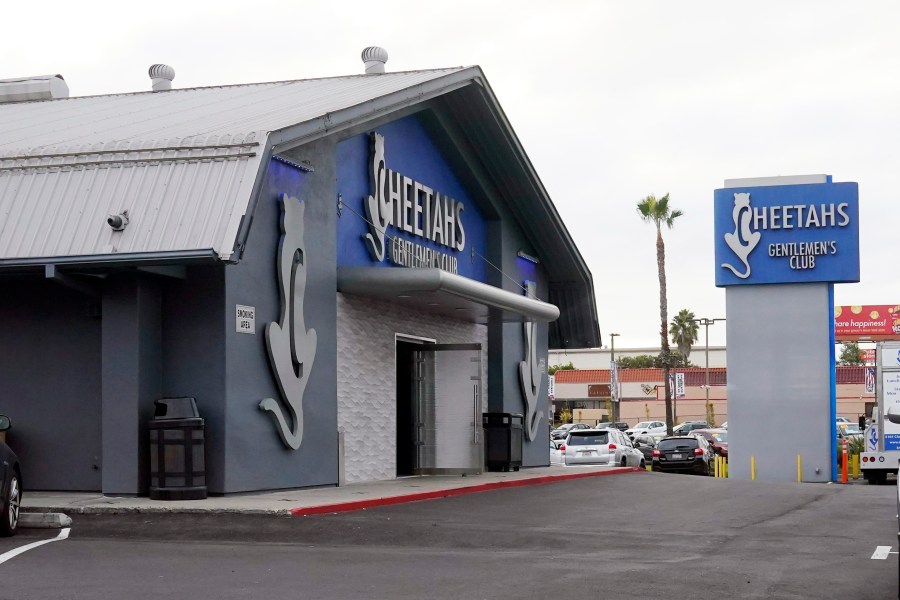California judge says strip club ruling also protects restaurants fighting coronavirus restrictions

FILE – In this Dec. 10, 2020, file photo, a person walks past Pacers Showgirls International in San Diego. San Diego County has suspended enforcement of COVID-19 restrictions on restaurants and live entertainment establishments after a local judge found in favor of two strip clubs that defied a state shutdown order and indicated the ruling applied more broadly. County officials said in a statement Wednesday evening, Dec. 16, 2020, that they and state officials are analyzing the scope of the ruling and discussing next steps including seeking clarity from the court. (AP Photo/Elliot Spagat, File)
SAN DIEGO (AP) — A California judge cleared the way Thursday for all restaurants in San Diego County to resume on-site dining, marking a major, if temporary, setback to the governor’s stay-at-home order to slow the spread of the coronavirus before the state’s intensive care units run out of beds.
Gov. Gavin Newsom immediately appealed, bringing uncertainty to restaurant owners weighing whether to buy food and schedule staff a week before Christmas amid the possibility that their victory could soon be reversed.
The case brought to the court by two San Diego strip clubs handed the biggest victory yet to California businesses fighting public health orders that they say have crippled them economically.
San Diego Superior Court Judge Joel Wohlfeil said his ruling Wednesday was “straightforward” in going beyond the strip clubs that sued the county and state, Cheetahs Gentlemen’s Club and Pacers Showgirls International. County officials requested the hearing to clarify its scope.
“It is intended to encompass all restaurants within the county of San Diego,” he said in a brief hearing that lasted all but eight minutes.

The county board of supervisors was scheduled to meet Friday in closed session to discuss next steps. The board voted 3-2 last week to appeal any adverse ruling on the strip clubs but that decision didn’t cover restaurants, rending it moot.
“The state of California is already appealing the decision, so whether the county joins it or not will have no impact on the outcome,” said county Supervisor Nathan Fletcher, who backs restrictions..
San Diego Mayor Todd Gloria said the city was working closely with the state to understand the implications.
“No one wants our small businesses to be closed, but the science and data are showing a dire trend in hospitalizations and deaths,” Gloria said.
The air of uncertainty hung over restaurant owners as they considered whether to reopen.
Some will reopen only for outdoor dining, said Miles Himmel, spokesman for county Supervisor Jim Desmond, who opposes state restrictions. Others are reluctant because an appeal may force them to close again after scrambling to buy food and schedule staff a week before Christmas. Some are reopening.
Hours after the injunction was issued Wednesday, San Diego County had suspended enforcement of its restrictions barring indoor and outdoor dining and live entertainment in the county of 3 million, the state’s second-most populous.
The ruling against the state restrictions comes as California registered a record 379 coronavirus deaths and more than 52,000 new confirmed cases Thursday.
Wohlfeil said in Wednesday’s ruling that the state had failed to show restaurants and strip clubs contributed to virus’ spread or shortage of hospital beds. He said “San Diego County businesses with restaurant services,” including the strip clubs, are exempt from shutdowns and “any related orders” that bar live adult entertainment and go beyond protocols “that are no greater than essential” to controlling the spread of COVID-19.
The judge noted that before being ordered to close in October, the two strip clubs operated for five weeks under their own safety measures — including keeping strippers 15 feet from tables, allowing no more than one stripper per stage and requiring them and other employees to wear masks.
Three restaurant owners, including one who owns several establishments in San Diego, said they were planning to reopen by the weekend. They did not want to be named for fear of being targeted by officials.
Angie Weber, the owner of Cowboy Star and and Butcher Shop in downtown San Diego, said she was waiting to see if officials appeal before calling her staff to return to work.
“For now we are very hopeful that the ruling will be upheld and we’ll be able to reopen with all of the safety protocols that we had previously put in place,” Weber said in an email Thursday.
Weber’s business was among two San Diego restaurants and two gyms that sued on behalf of their industries, asking that California’s four-tier system of pandemic restrictions be declared illegal. The judge in that case denied their request to resume indoor activity.
In a similar lawsuit against Los Angeles County, a judge found the health director acted “arbitrarily” and didn’t prove that health benefits outweigh the negative economic effects before issuing a ban on indoor and outdoor dining. But the case did not encompass the actions of the state, which issued its order Dec. 3 that kept restrictions in place allowing only takeout and delivery services and barring social gatherings.
Associated Press writer John Antczak contributed to this report from Los Angeles. Trademark and Copyright 2020 The Associated Press. All rights reserved.














